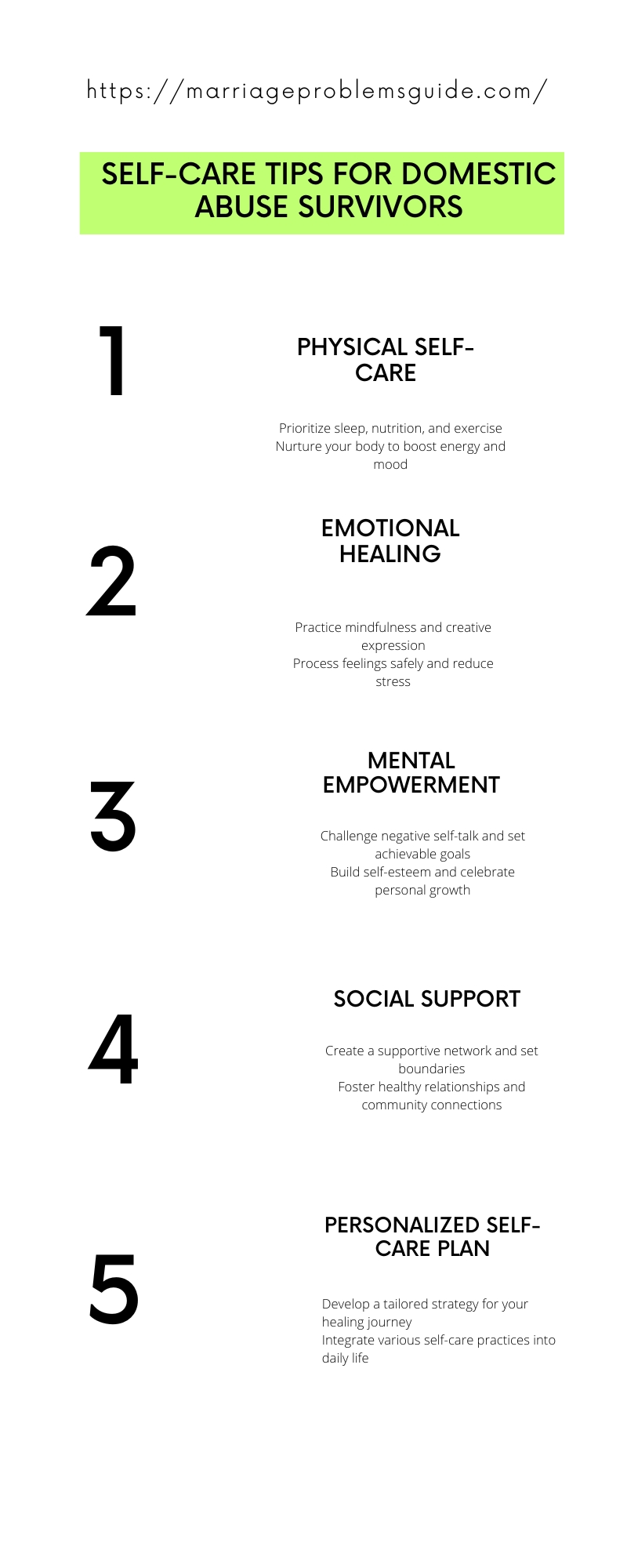Surviving domestic abuse is a journey that requires immense strength and resilience. As survivors begin to rebuild their lives, self-care becomes an essential component of the healing process.
This blog post aims to provide domestic abuse survivors with practical, compassionate, and effective self-care strategies to support their journey towards healing and empowerment.
Understanding Self-care for Domestic Abuse Survivors
Self-care for domestic abuse survivors goes beyond simple relaxation techniques. It encompasses a holistic approach to nurturing one’s physical, emotional, and mental well-being. For survivors, self-care is about reclaiming autonomy, rebuilding self-esteem, and creating a safe space for healing.
The Importance of Self-care in the Healing Process
- Promotes emotional healing
- Reduces stress and anxiety
- Improves physical health
- Enhances self-esteem and self-worth
- Helps in establishing healthy boundaries
- Supports overall well-being and quality of life
Physical Self-care Strategies
1. Prioritize Sleep and Rest
Quality sleep is crucial for both physical and mental recovery. Establish a consistent sleep routine and create a comfortable sleeping environment.
Tips for better sleep:
- Aim for 7-9 hours of sleep per night
- Create a relaxing bedtime routine
- Avoid screens at least an hour before bed
- Use comfortable bedding and pillows
2. Nourish Your Body with Healthy Food
Proper nutrition can significantly impact mood and energy levels. Focus on eating balanced, nutritious meals.
Nutritional tips:
- Include a variety of fruits and vegetables in your diet
- Choose whole grains over refined carbohydrates
- Incorporate lean proteins and healthy fats
- Stay hydrated by drinking plenty of water
 3. Engage in Regular Physical Activity
3. Engage in Regular Physical Activity
Exercise can help reduce stress, improve mood, and boost self-confidence. Find activities that you enjoy and feel safe doing.
Exercise ideas:
- Walking or jogging in a safe area
- Home workout videos
- Yoga or stretching exercises
- Swimming or water aerobics
Emotional Self-care Strategies
1. Practice Mindfulness and Meditation
Mindfulness can help survivors stay grounded in the present moment and manage overwhelming emotions.
Mindfulness techniques:
- Deep breathing exercises
- Body scan meditation
- Guided imagery
- Mindful walking
2. Express Your Feelings Through Creative Outlets
Creative activities can provide a safe way to process emotions and experiences.
Creative expression ideas:
- Journaling or writing
- Painting or drawing
- Coloring in adult coloring books
- Creating music or dancing
3. Seek Professional Support
Working with a therapist or counselor specializing in domestic abuse can provide valuable support and guidance in the healing process.
Benefits of professional support:
- Safe space to process trauma
- Learning coping strategies
- Addressing underlying issues
- Building self-esteem and confidence
Mental Self-care Strategies
1. Challenge Negative Self-talk
Domestic abuse can lead to negative self-perception. Learn to recognize and challenge these thoughts.
Techniques for challenging negative self-talk:
- Identify negative thought patterns
- Question the validity of these thoughts
- Replace negative thoughts with positive, realistic ones
- Practice positive affirmations
2. Set Realistic Goals and Celebrate Achievements
Setting and achieving goals, no matter how small, can boost self-esteem and provide a sense of progress.
Goal-setting tips:
- Start with small, achievable goals
- Break larger goals into manageable steps
- Celebrate each milestone, no matter how small
- Be kind to yourself if you encounter setbacks
3. Engage in Continuous Learning
Learning new skills or pursuing interests can be empowering and help rebuild self-confidence.
Learning opportunities:
- Online courses or workshops
- Reading self-help books
- Learning a new language
- Developing a new hobby or skill
Social Self-care Strategies
1. Build a Support Network
Surrounding yourself with supportive people is crucial for healing and growth.
Ways to build a support network:
- Join support groups for domestic abuse survivors
- Reconnect with trusted friends and family
- Participate in community activities or volunteering
- Consider online support communities
2. Practice Setting Boundaries
Learning to set and maintain healthy boundaries is an essential skill for survivors.
Boundary-setting tips:
- Identify your personal limits and needs
- Communicate your boundaries clearly and firmly
- Practice saying “no” to requests that make you uncomfortable
- Recognize and respect others’ boundaries
3. Engage in Positive Social Activities
Participating in enjoyable social activities can help rebuild social connections and boost mood.
Social activity ideas:
- Attend local community events
- Join a club or group related to your interests
- Volunteer for a cause you care about
- Plan regular catch-ups with supportive friends
Spiritual Self-care Strategies
1. Connect with Your Values and Beliefs
Reconnecting with your core values and beliefs can provide a sense of purpose and direction.
Ways to explore your values:
- Reflect on what’s most important to you
- Write a personal mission statement
- Explore different philosophical or spiritual teachings
- Engage in activities that align with your values
2. Practice Gratitude
Focusing on gratitude can help shift perspective and promote positivity.
Gratitude practices:
- Keep a daily gratitude journal
- Share one thing you’re grateful for each day with a friend
- Practice gratitude meditation
- Write thank-you notes to people who have supported you
3. Engage in Mindful Nature Experiences
Connecting with nature can be calming and grounding for many survivors.
Nature-based activities:
- Take walks in local parks or nature reserves
- Practice outdoor meditation or yoga
- Engage in gardening or plant care
- Spend time observing natural surroundings
Creating a Personalized Self-care Plan
Developing a personalized self-care plan can help survivors integrate these strategies into their daily lives effectively.
Steps to Create Your Self-care Plan:
- Assess your current self-care practices
- Identify areas that need more attention
- Choose strategies that resonate with you
- Set realistic goals for implementing new practices
- Schedule self-care activities in your daily routine
- Regularly review and adjust your plan as needed
Self-care Strategies for Different Stages of Healing
| Stage of Healing | Focus Areas | Recommended Strategies |
|---|---|---|
| Early Stage | Safety and Stabilization | • Establish a safety plan<br>• Focus on basic needs (sleep, nutrition)<br>• Seek professional support |
| Middle Stage | Processing and Grief | • Engage in trauma-informed therapy<br>• Practice emotional regulation techniques<br>• Explore creative expression |
| Later Stage | Integration and Growth | • Set future-oriented goals<br>• Engage in personal development activities<br>• Give back to the community |
Conclusion
Self-care is a vital component of the healing journey for domestic abuse survivors. By implementing these strategies and developing a personalized self-care plan, survivors can nurture their well-being, rebuild their lives, and move towards a future of empowerment and growth.
Remember, healing is a process, and it’s okay to take it one day at a time. Each small step in self-care is a step towards reclaiming your life and your happiness

Additional Resources:
1.Signs of Domestic Violence in Relationships
2.Getting Help for Domestic Violence
3.Escaping Domestic Violence Safely: A Step-By-Step Guide For Victims of Abuse
4.Is Offensive Touching Domestic Violence? Understanding the Complexities
5.15 Expert Domestic Violence Prevention Tips for A Safer Home







